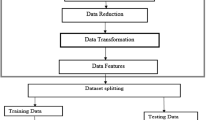Abstract
Since software development projects often fall into runaway situations, detecting signs of runaway status in early stage of development has become important. In this paper, we propose a new scheme for the prediction of runaway projects based on an empirical questionnaire. We first design a questionnaire from five viewpoints within the projects: requirements, estimations, planning, team organization, and project management activities. Each of these viewpoints consists of questions in which experience and knowledge of software risks are included. Secondly, we classify projects into “runaway” and “success” using resultant metrics data. We then analyze the relationship between responses to the questionnaire and the runaway status of projects by the Bayesian classification. The experimental result using actual project data shows that 33 out of 40 projects were predicted correctly. As a result, we confirm that the prediction of runaway projects is successful.
Access this chapter
Tax calculation will be finalised at checkout
Purchases are for personal use only
Preview
Unable to display preview. Download preview PDF.
Similar content being viewed by others
References
Boehm, B.W.: Industrial software metrics top 10 list. IEEE Software 4, 84–85 (1987)
Jiang, J., Klein, G.: Software development risks to project effectiveness. Journal of Systems and Software 52, 3–10 (2000)
Wohlin, C., Andrews, A.A.: Prioritizing and assessing software project success factors and project characteristics using subjective data. Empirical Software Engineering 8, 285–303 (2003)
Williams, R.C., Pandelios, G.J., Behrens, S.G.: Software risk evaluation (SRE) method description (version 2.0). Technical Report CMU/SEI-99-TR-029, Software Engineering Institute (1999)
Conrow, E.H., Shishido, P.S.: Implementing risk management on software intensive projects. IEEE Software 14, 83–89 (1997)
Fairley, R., Rook, P.: Risk management for software development. In: Software Engineering, pp. 387–400. IEEE CS Press, Los Alamitos (1997)
Karolak, D.W.: Software Engineering Risk Management. IEEE CS Press, CA (1996)
Sisti, F.J., Joseph, S.: Software risk evaluation method version 1.0. Technical Report CMU/SEI-94-TR-19, Software Engineering Institute (1994)
Humphrey, W.S.: A Discipline for Software Engineering. Addison-Wesley, MA (1995)
Yourdon, E.: Death March: The Complete Software Developer’s Guide to Surviving ‘Mission Impossible’ Projects. Prentice-Hall Computer Books, Englewood Cliffs (1997)
Fenton, N.E., Pfleeger, S.L.: Software Metrics: A Rigorous & Practical Approach. PWS Publishing (1997)
Mizuno, O., Kikuno, T., Takagi, Y., Sakamoto, K.: Characterization of risky projects based on project managers’ evaluation. In: Proc. of 22nd International Conference on Software Engineering, pp. 387–395 (2000)
Author information
Authors and Affiliations
Editor information
Editors and Affiliations
Rights and permissions
Copyright information
© 2004 Springer-Verlag Berlin Heidelberg
About this paper
Cite this paper
Mizuno, O., Hamasaki, T., Takagi, Y., Kikuno, T. (2004). An Empirical Evaluation of Predicting Runaway Software Projects Using Bayesian Classification. In: Bomarius, F., Iida, H. (eds) Product Focused Software Process Improvement. PROFES 2004. Lecture Notes in Computer Science, vol 3009. Springer, Berlin, Heidelberg. https://doi.org/10.1007/978-3-540-24659-6_19
Download citation
DOI: https://doi.org/10.1007/978-3-540-24659-6_19
Publisher Name: Springer, Berlin, Heidelberg
Print ISBN: 978-3-540-21421-2
Online ISBN: 978-3-540-24659-6
eBook Packages: Springer Book Archive




